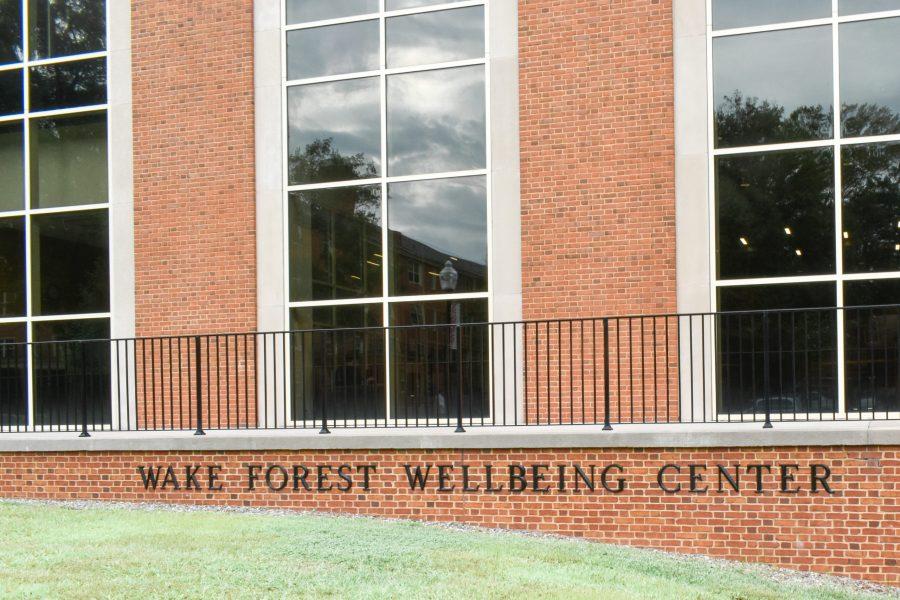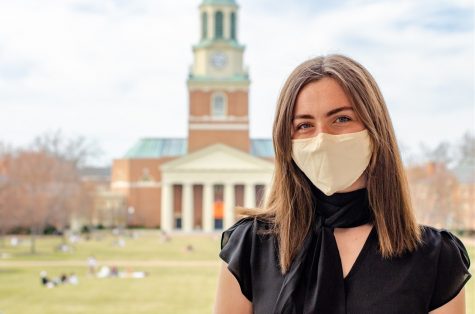Finding support in the time of COVID-19
September 17, 2020
After only one month back on campus, a large portion of the student body is struggling with mental health in ways they never have before. People feel isolated due to online classes and limited human contact, and the University Counseling Center’s (UCC) lack of staffing and funding, as reported by the Old Gold & Black this summer, has not been helping students deal with the hardships presented by the tumult of the past year.
So where does one go when they feel isolated, overwhelmed, overworked and out of touch? While many students automatically think that the UCC is the only place to turn, Wake Forest is home to a number of offices that offer one-on-one healing and support.
This three-part news series will explore a handful of traditional and non-traditional campus organizations and educate readers on the resources that exist and are underused, as well as the programs that might not be as developed as they should be. The Chaplain’s Office, The Office of Wellbeing and the University Counseling Center are all tangible resources that the school provides.
The goal is to bring awareness to the different organizations that specialize in spirituality, wellness and mental health so that, pandemic or not, students have a list of potential offices to visit through life’s inevitable ebbing and flowing.
In terms of the current struggles that people are facing, University Chaplain Reverend Tim Auman understands how difficult these times are on students, faculty and staff.
“Relationships flourish in an environment of intimacy,” Auman said. “The thing we need most in this life, now more than ever, is deep connection. We both want and fear vulnerability, but you can’t truly have that with Zoom or Google Meet. People, for the most part, are struggling.”
The Office of the Chaplain is rooted in the fundamental belief that there is a spiritual dimension to existence. This spirituality is inclusive to everyone, regardless of the religion (or lack thereof) that one practices. The Chaplain’s office offers pastoral care and mindfulness-based coaching to anyone, regardless of affiliation.
Religion, by its very definition, is an organized set of beliefs and practices, usually shared by a community or group. Spirituality, on the other hand, is a far more individualized practice and focuses on developing a sense of inner peace.
While around 30% of Wake Forest’s student body does not identify with any given faith, no one is excluded from the help and care that the Chaplain’s office provides.
Through their collaboration with The Office of Wellbeing, the UCC and Student Health Services, the Office of the Chaplain is also able to refer students to clinically trained therapists and/or psychiatrists.
When asked what sort of support the Chaplain’s office is able to offer students, Aumam had a list of examples at the ready.
“Sometimes people just need a conversation partner. And that can look very religious sometimes. Other times, it can have more of a spiritual component. Even if you want to talk about the existential questions — the really fun ones — like, ‘What is this life?’ or ‘What am I called to do through this short, amazing experience of being human?’, part of our work is to give space to honor and support these questions,” he said.
Auman believes that to enter a place of knowing, that is, self-awareness and true presence, one must seek silence. When that happens, one becomes more resilient and fearless.
“How wonderful would it be to go through the world 10% less afraid,” Auman asked, a lightness in his voice.
Wonderful might just be the understatement of the century. The way to arrive at this sense of inner stillness and courage? Mindfulness.
“Mindfulness impacts your physiological wellbeing, your emotional wellbeing, your relationships, your scholarship, your creativity, and your cardiovascular health,” Auman said.
The Office of the Chaplain (through the work of Auman himself) is responsible for implementing the MindfulWake campaign and, in doing so, created a space in which Wake Forest students, faculty, staff and administrators are taught the basics of mindful living. Lessons such as how to embrace life as it is in the moment, how to set aside ruminations about the past and anxieties about the future and how to cultivate positive states of mind such as gratitude, joy and compassion.
The main way in which students become introduced to mindfulness through the Chaplain’s office is through KORU Mindfulness — a four-week, skills-based mindfulness program that Auman teaches.
Junior Maya Mehta participated in the KORU Mindfulness program the fall of her sophomore year.
“KORU was a great way to learn about the basic skeleton of what mindfulness is and Reverend Tim taught us how to be more mindful in everyday situations, from doing walking meditations to eating slowly and mindfully,” Mehta said. “I looked forward to these classes because they served as a break from schoolwork while simultaneously emphasizing how to be present and adopt a more positive mindset.”
Auman hopes to make experiences like Mehta’s universal.
“My hope is that at some point, hopefully, every Wake Forest staff person, every student and faculty member will go through that basic KORU course and learn that basic tools so that they come out of those four weeks more curious,” Auman said.
If you are interested in talking with Rev. Auman about your current life situation, want to join KORU Mindfulness or are interested in learning more about mindfulness itself, call the Office of the Chaplain at 336.758.5210.























